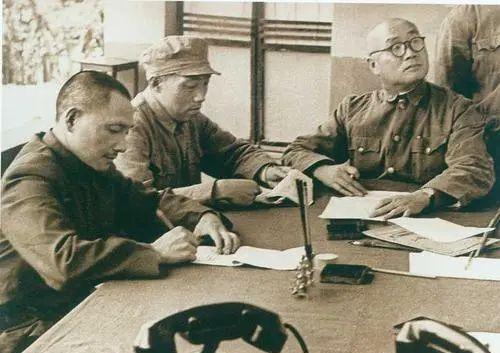After the outbreak of the War of Resistance Against Japanese Aggression, the original Red Army units were reorganized into the Eighth Route Army of the National Revolution, of which the original Red Fourth Front, except for the Red Fourth Army and the Thirty-first Army, had special tasks, and the rest were reorganized into the 129th Division of the Eighth Route Army, with division commander Liu Bocheng, political commissar Zhang Hao, and deputy division commander Xu Xiangqian.

Marshal Liu Bocheng is the famous military god of our army, and the people who partner with him are naturally not ordinary people, but why do we often hear about the "Liu Deng" army instead of the "Liu Zhang" army?
In fact, Zhang Hao was the first political commissar of the 129th Division of the Eighth Route Army, and Deng Xiaoping was only later appointed as the political commissar of the 129th Division, and the core figures of Liu Deng's army were also Liu Bocheng and Deng Xiaoping, so where did Zhang Hao go later? Why did he leave the 129th Division?
<h1 class="pgc-h-arrow-right" > who is Zhang Hao? </h1>
Zhang Hao, born in 1897, a native of Huanggang, Hubei Province, whose original name was Lin Yuying, was Lin Biao's cousin. He joined the Communist Party very early, joining the Communist Party in 1922, older than most marshals.
After the outbreak of the Anti-Japanese War, he was appointed political commissar of the 129th Division, and in September 1937, Liu Bocheng and Zhang Hao led the troops of the 129th Division to the Shanxi Battlefield to fight against Japan. Under the leadership of Liu Bocheng and Zhang Hao, the troops first attacked Yangmingbao Airfield at night, blowing up 24 enemy aircraft, greatly dealing a blow to the Japanese air force and perfectly cooperating with the Battle of Xinkou.
After that, the 129th Division moved to many places, all of which achieved good results, and the troops were expanded from the initial 4 regiments to 6 regiments, and the anti-Japanese regime was established in more than 20 counties.
At the same time, Zhang Hao also initiated the organization of 15 teams such as workers' guerrillas and peasant self-defense units, and in order to rapidly expand the base areas and develop, Zhang Hao forgot to eat and sleep, and constantly trained local cadres and officers of the troops, resulting in serious physical overdraft and eventually falling ill.
Zhang Hao was a worker in his early years, organizing the workers' movement and the Pingjiang Uprising. Moreover, his footprints are all over the country, with rich experience in organization and combat, at this time he fell ill, and many work will stagnate, which is a disaster for the base areas that urgently need development.
Liu Bocheng promptly reported his situation to the chairman in Yan'an, but the chairman could not finalize the candidate for the post of political commissar. Because this position was too important, At that time, Liu Bocheng also proposed that Xu Xiangqian, the deputy division commander, replace him as the division commander and serve as the political commissar himself. At that time, the chairman refused, saying that he had another arrangement for Xu Xiangqian.
<h1 class="pgc-h-arrow-right" > Liu Bocheng recommended Deng Xiaoping</h1>
Eventually, Liu Bocheng thought of one person, and that was Deng Xiaoping, who was still organizing a field mobilization committee on the Shanxi front to propagate anti-Japanese resistance. He didn't know he would have a big task, but Liu Bocheng tried to convince the chairman.
Several reasons were put forward for recommending Deng Xiaoping: Most of the soldiers of the First 129th Division were Sichuanese, and Deng Xiaoping was also a Sichuanese; second, he was currently serving as the deputy director of the General Political Department of the Eighth Route Army, and he had the ability to serve as a political commissar, and others were also convinced. Third, the other side's organizational ability is strong, and the organization and leadership of the Baise Uprising in that year are enough to show the ability; and Deng Xiaoping was only 33 years old at the time, young and strong, and it was when he was energetic, which was also the most crucial point.
Finally, after consideration, the chairman agreed to let Deng Xiaoping serve as the political commissar of the 129th Division, and the legend of the "Liu Deng" army began. Zhang Hao, because his body was too weak, was sent to Yan'an in early 1938 to recuperate, so there was not much about him in the War of Resistance.
The older generation of revolutionaries has an excellent quality, that is, they cannot stay idle. After recuperating in Yan'an for a while, he began to work again, founded the monthly magazine "Chinese Workers", worked day and night, let his body completely collapse, and died of illness in Yan'an on March 6, 1942.
After his death, Chairman Mao raised 8 words for him: "Loyalty to the country, although death is still honorable!" "Admirable!